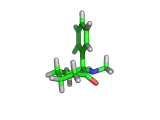Wed Oct 15 14:24:15 PDT 2008
Ketamine, Feynman, and Altered States of Consciousness
In the 1960s Richard Feynman became interested in out of body experiences. Feynman had long been interested in dreams and hypnotism, and was eager to explore his brain's capabilities. So Feynman befriended an expert. On this occasion it was the Los Angeles based John Lilly. Lilly had all the equipment needed, including sensory deprivation tanks filled with Epsom Salts, and promised Feynman some interesting experiences.
However, sitting in a darkened tank of warm Epsom salts solution alone for hours on end did not achieve any unusual effects and eventually Feynman resorted to taking ketamine, the molecule you see below. He took a much smaller than normal dose and this drug kick started Feynman's ability to hallucinate.

Ketamine is used as an anesthetic, it also creates a sense of separation between the mind and body. This was what Feynman duly experienced. He describes in 'Surely You're Joking Mr. Feynman!' how in the sensory deprivation tank he became dissociated from his body, feeling as though both his hands, for example, were on the same side of his self, rather than in their normal positions, one on each side.
Soon Feynman was able to hallucinate without ketamine. However, he always needed the help of the sensory deprivation tank.
What did Feynman accomplish while in an altered state of consciousness? The short answer is nothing. At one point Feynman became convinced that he had made a discovery on the way that memories are stored in the brain. However, once the hallucination (for that was all it was) had ended the emptiness of the discovery was readily apparent.
It would be interesting to know whether Feynman experienced any permanent changes as a result of taking ketamine or whether, once trained in what to expect (Pavolv style) whether strange experiences naturally followed the ritual of the sensory deprivation tank.
Feynman was always most protective of his brain, and for good reason. He had such fun thinking and solving problems that he could not bear the prospect of being separated from the device which brought him such pleasure. Feynman gave up drinking alcohol and never took LSD although he was curious about both he did not want to risk damaging his mind. The experiment with ketamine was mediated, according to Feynman, by a medical doctor. However, you can't help but think that it would have been better if he had not experimented with this perturbation to his normal brain function.